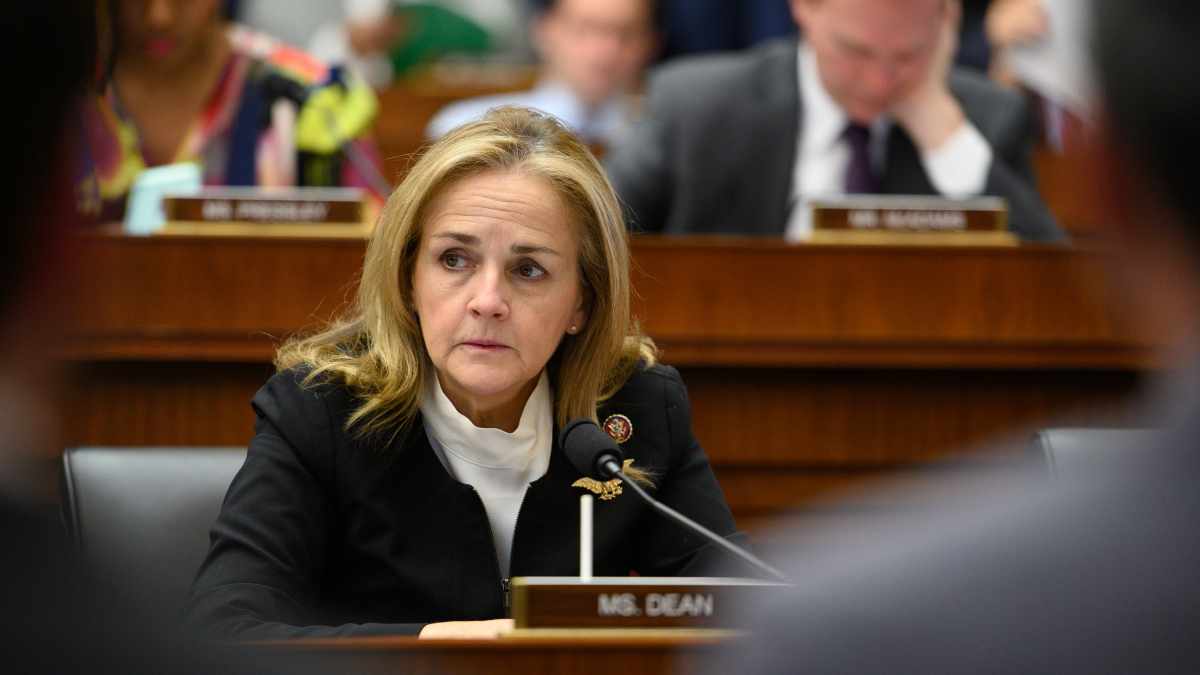Delaware Valley U.S. Rep. Madeleine Dean (D-Montgomery) called the newly-passed infrastructure bill “an economic engine” during a Democratic Zoom press conference touting the legislation.
Several Pennsylvania Democratic members of Congress joined the call Wednesday to take a victory lap over the passage of the $1.2 trillion Infrastructure Investment and Jobs Act. The Biden administration says it will bring more than $15 billion to Pennsylvania over five years.
Asked whether the bill, coupled with the pending $1.75 trillion Build Back Better Act, will add to what is already a 31-year high level of inflation—up 6.2 percent in the last year–the Democratic lawmakers insisted it would not.
Congresswoman Susan Wild (D-Lehigh/Northampton) said “responsible journalists” would not suggest these massive spending bills would “directly affect the current state of inflation.”
Dean agreed.
“I think a lot of what we’re doing here is actually going to curb inflation over the next few months…We’re going to see getting people back to work, getting our supply chains working…I hope nobody is going to tie the passage of these two bills to the current inflation rates because there is simply no relationship.”
President Joe Biden was careful to look at where the resources are coming from to pay for these bills, she said.
“I am mindful, and I want to acknowledge, my constituents asked me about their concerns about inflation, cost of goods, cost of gas, so that is real. But these two bills are not the problem. The problem is multi-faceted and it’s certainly deeply connected to COVID and an economic closure and then once you reopen an economy, how you rebound from that closure. These two bills are going to be extraordinary economic engines for our future.”
Congressman Matt Cartwright (D-Wayne/Pike/Lackawanna) said the last time there was a similar investment in American infrastructure was under President Dwight Eisenhower in the 1950s, when the interstate highway system was built. And he added “top economists” note that when companies produce more it will bring the prices down and this bill will “grease the skids” to allow them to do that.
“These inflationary pressures that we’re seeing, they all have to do with reopening our economy after COVID,” he said. “Obviously, the demand has outstripped the supply.” He also noted that Jerome Powell, chairman of the Federal Reserve, has tools “at his disposal” to put the brakes on it.
“We’re not particularly worried about inflation getting out of hand. We can control that,” said Cartwright.
In her remarks on the bill, Dean said her district is “an older ring suburb of Philadelphia which is crying out for this type of investment.”
The bill will bring $11 billion to roads and bridges to Pennsylvania: $100 million to broadband, 2.8 billion for public transportation, $355 million for airports, $240 million for weatherizing, and $1.4 billion for safe drinking water.
Congressman Dwight Evans (D-Philadelphia) said the bill will bring money for improvements to public transportation and add more jobs.
“It is very beneficial,” said Evans. “SEPTA (Southeastern Pennsylvania Transit Authority) just settled a contract because of the American Rescue Act. And now the infrastructure…When you talk about SEPTA and what it means to the entire region…And all of us who are on this phone today all played key roles in making this happen, working with the president and vice president.”
“This is building on what we did before at the state level,” said Evans.
“It’s something everybody Democratic and Republican can be proud of,” said Dean.
Congressman Brian Fitzpatrick (R-Bucks), who was one of 13 Republicans who voted for the bill, was not on the Democrats’ virtual press conference. However, he released this statement: “This is a victory for not only the people of Pennsylvania but for the entire country. The federal government has created the crisis of deteriorating roads, defunct bridges, and vulnerable dams and levees through its inaction. These types of arteries are the lifeblood of American commerce and must be improved. America’s infrastructure has reached a breaking point, and this is a challenge we can no longer ignore.
“From the start, I have insisted on the passage of a hard infrastructure bill, delinked from any other partisan, social spending package. This bipartisan, physical infrastructure bill, which passed the Senate in August with strong Republican support, is entirely separate from the partisan reconciliation bill, which I oppose.
“The bipartisan infrastructure package is completely paid for, primarily by unspent COVID-19 relief funds, and will create a dedicated funding stream for our nation’s infrastructure network. I look forward to the President signing this landmark physical infrastructure legislation into law so that we can bring America’s infrastructure network into the 21st century, create jobs, and improve the health and safety of the American people,” Fitzpatrick said.
Follow us on social media: Twitter: @DV_Journal or Facebook.com/DelawareValleyJournal

